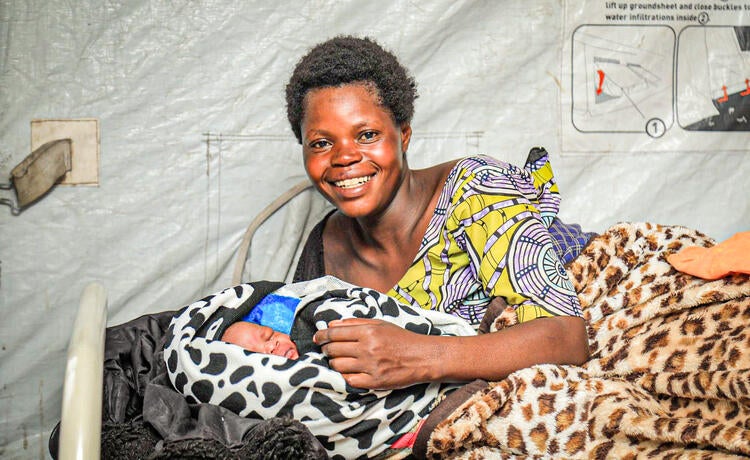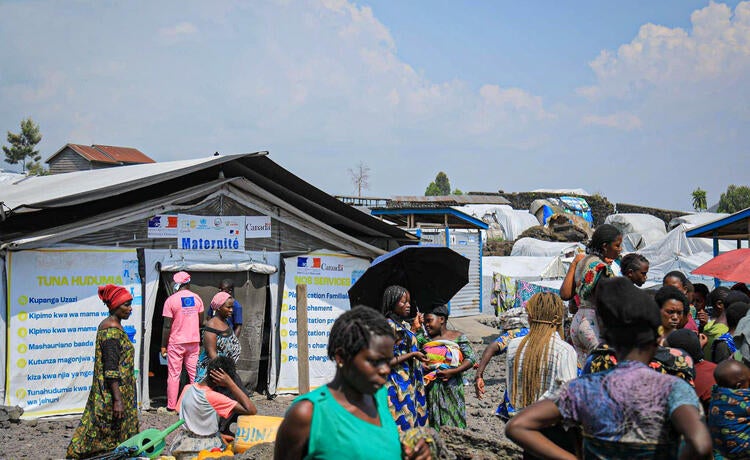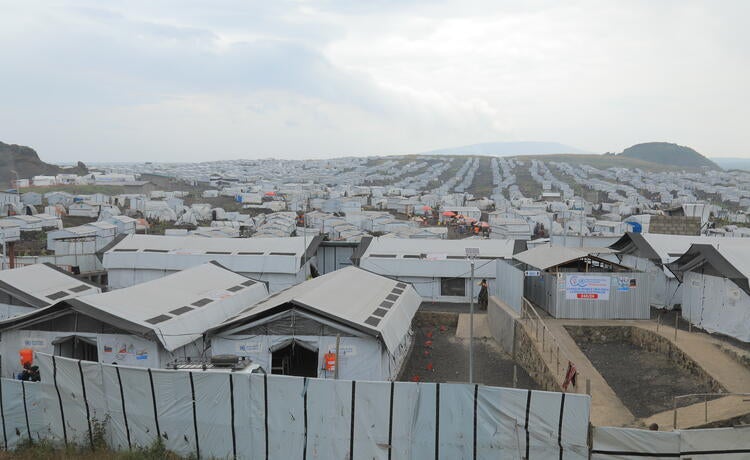News
Giving birth under fire in North Kivu, as conflict grips the Democratic Republic of the Congo
- 12 February 2025
News
NORTH KIVU PROVINCE, The Democratic Republic of the Congo – As fighting intensified in North Kivu, in the east of the Democratic Republic of the Congo, Francine Toyata clutched her pregnant belly, waves of pain coursing through her.
It was 2 a.m. when she went into labour, in the heart of a warzone. “I have been displaced twice since January, and was sheltering in an overcrowded camp,” she told UNFPA, the United Nations sexual and reproductive health agency.
Fighting between national armed forces and rebels from the Mouvement du 23 Mars (M23) group erupted in January 2025 near Goma, the provincial capital of North Kivu. Hundreds of thousands have been forced to flee their homes and are seeking refuge in formal and informal camps, in an area that was already under strain from high numbers of displaced people.
Ms. Toyata is originally from Kabati, in the Rutshuru territory, but fled with her husband in February 2023 as clashes gripped their area. Now, with the sound of bombs echoing through the camp, she travelled through darkness and chaos with her mother to reach a UNFPA-supported mobile health clinic just in time.
Access to life-saving reproductive health services was scarce in the region even before the current escalation in fighting, and the country had one of the world’s highest rates of maternal deaths due to pregnancy and birth-related complications.
Now, as just one third of hospitals in the region and one in five health centres are able to function, UNFPA’s mobile health teams are often the only option women have to deliver with the support of skilled health workers.

Two hours after she arrived, Ms. Toyata gave birth to a baby girl – safely, in good health, but in the most precarious of circumstances. Gazing down at her daughter she said, “I will name her Amani – Peace. Because she was born in war, but she will stand for peace.”
A multitude of dangers for women and girls
Despite being one of the few remaining safe spaces for displaced women and girls in North Kivu, the fragile tent that houses the mobile health unit afforded scant protection from the approaching explosions.
“It is for women like Francine that we do this work,” said her midwife, Nelly. “We were not safe. We need more support to meet these urgent needs.”
Of the 220,000 estimated pregnant women in North and South Kivu alone, more than 12,000 are currently displaced, with no assured access to medical care. Over 88,000 women and girls are at risk of gender-based violence, and unintended pregnancies are expected to rise due to the collapse of health services.
In recent years, incidents of gender-based violence, including assault, rape and coercion, have soared across the country, in recent years, with two thirds of cases reported in the eastern provinces of Ituri, North Kivu and South Kivu. Minimal security in crowded displacement camps, hunger and barely any opportunities to earn a stable income have also left many with few places to turn to support their families: The risks of exploitation and abuse for women and adolescent girls, including forced marriage, human trafficking and survival sex, are reported to be rising sharply too.

This is just as access to sexual and reproductive health services are forced to shutter due to rising insecurity and dwindling supplies, with critical humanitarian corridors blocked by fighting.
As the conflict escalates, bombs have started hitting camps for internally displaced people, forcing more women and girls to flee, yet again, and stripping them of the few safety nets they had left. A number of UNFPA-supported mobile health clinics and listening centres have also been looted and destroyed and temporarily suspended services, further reducing the options available to people in dire need of them.
Urgent needs
UNFPA is currently operating eight mobile health clinics across the region, which are staffed by 27 midwives delivering critical maternal and reproductive care. Three health facilities that support displaced people across eight camps are ensuring safe deliveries, prenatal care, and family planning for more than 8,000 people.

Contraceptives and other reproductive health supplies are being distributed, despite treacherous conditions and disruptions. For survivors and those at risk of gender-based violence, a hotline is offering immediate support, referrals, and protection options while five UNFPA-supported safe spaces for women and girls continue to provide a refuge and psychosocial care.
UNFPA remains in North Kivu, working alongside the government and humanitarian partners to ensure women and girls receive life-saving care. But the needs are growing faster than resources can keep up. Francine’s story is not unique. There are thousands of other women bracing for childbirth in tents, under bombardment, unsure if they or their babies will survive the night.